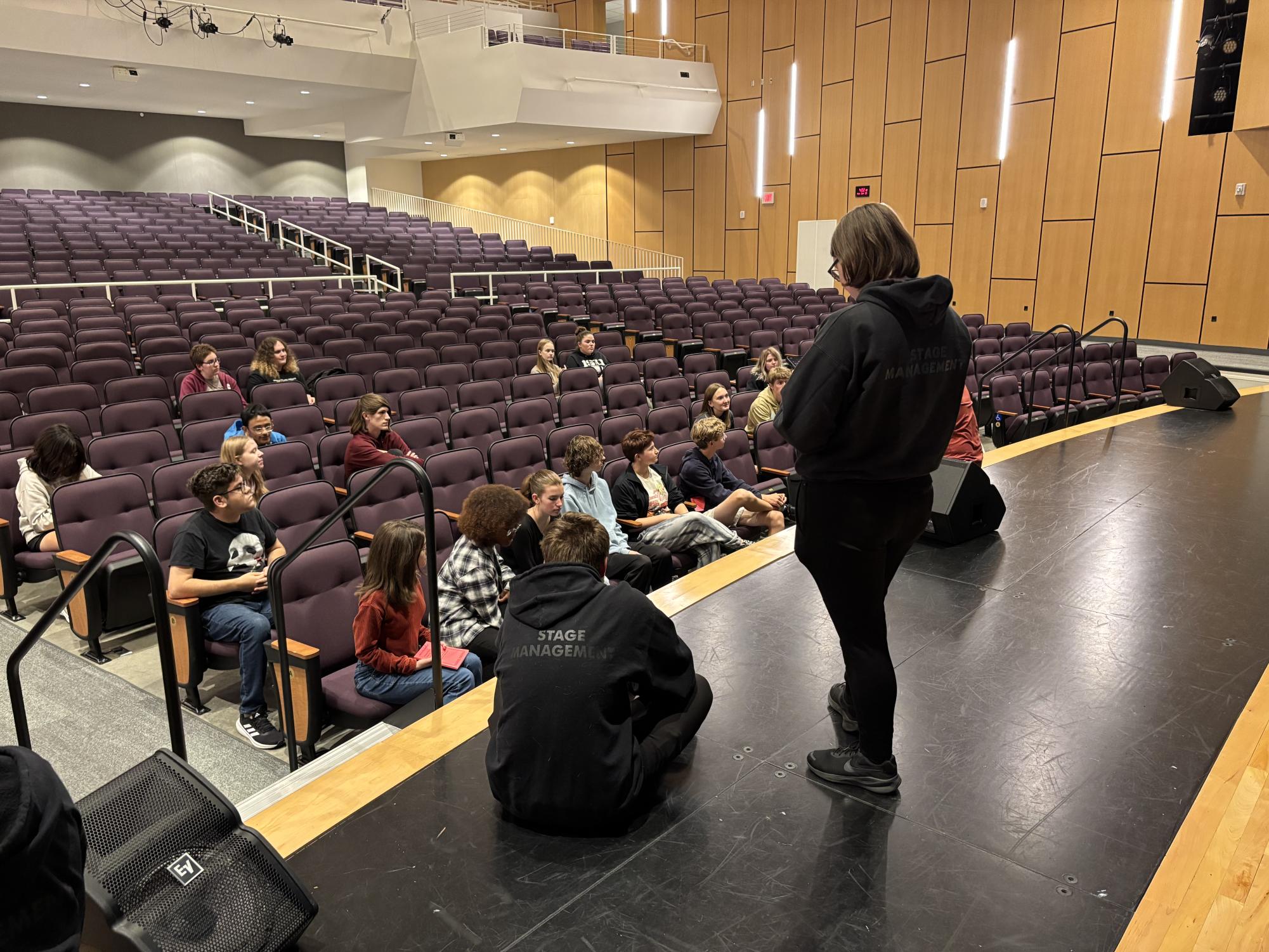The life of stage managers Ty Plante ‘26, Cecelia Freeman ‘27, and Finn Gould ‘25 can be described in two words ‘organized chaos’. Stage managers act as second-in-command to the director. In turn, they take on a load of responsibilities to make sure the show runs smoothly.
In this year’s production of Alice in Wonderland we take a peek behind the curtain to see what life is like for the backbones of this renowned program.
“It starts with who is interested and then I have a talk with those individuals. Based on that conversation [with the students] is who I ask to become a part of stage management,” Jeremy Fitzpatrick, the director, said.
There are three main categories stage managers fall into, firstly, Assistant Stage Manager, who are typically freshmen and spend their year learning how to become a stage manager, Stage Manager, the next step for ASM’s to run their own wing while teaching ASM’s, and lastly Production Stage Manager, a job saved solely for one senior, the PSM sits in the upper booth monitoring and relaying information to SM’s in the wings. No matter the position there is always a sense of pressure as the days pass by until opening night.
“The stress can be a very positive thing and push you to your limits to force you to grow,” Freeman ‘27 said.
To grow in the stress as Freeman says, stage managers have to learn often by watching. That means from September to November the stage managers are there every step of the way.
“…add in [the hours from] set builds on Saturdays and Sundays, and performances for a total of say 130 hours. Just being at rehearsals and performances would be a lot less, about 90 [hours],” Gould said.
To make a show run, stage managers must know when to run, a theater term for the action that moves set pieces on and off the stage, knowing the cue doesn’t lie solely on the shoulders of the crew. Stage managers use headsets as a way to communicate from the wings to the booths.
“…last year we were lucky enough to get another eight headsets, which allowed us to expand our crew. Additionally, in our theater there’s speakers in each dressing room and in the band and choir rooms, that we can give actors reminders through too,” Gould said.
Cues, a command, or call, given by the PSM, are necessary to the theater. If the crew is unaware of when they are meant to run, then the whole production will fall apart.
“PSM’s give calls for “Standbys” before an action is done, then [to start the run] they’ll say something like ‘light queue #210 go’ or ‘scene change go’,” Gould said.
This will be Senior Finn Gould’s fourth year as stage manager. As a senior, Gould gets the honor, and stress, of being the PSM. Gould sits at a table and keeps notes in for blocking, a term used to describe the movement or placement of people or things on the stage. Later in the rehearsal process, Gould is the one to call cues over the headsets.
“I’m not what I’d call a ‘strong speaker’, and it’s not something I’ve really done myself. I know I’ll get it down by the end of the show,” Gould said.
Stage managers, after spending hours in the theater filled with both stress and fun, have created their own traditions and jokes to keep rehearsals exciting.
“Every year we’ve done tech week bingo…my favorite spaces being; I run over my toe, accident black out, and an actor says a theater version of copy pasta,” Gould said.
However, not everything can be easy for stage manager’s. Stage managers have to make difficult decisions every day and it’s made harder by being around peers.
“I like goofing off, but I must be a role model for the rest of the theater,” Plante said.
Some stage managers are given specific jobs based on what wing they are in. Plante is in his third year as a stage manager. Plante manages the stage left wing. Stage left has special control over a pulley system called the ‘rails’. The rails can lower and lift different backgrounds or mesh walls like used in Fiddler on the Roof in the Spring of 2024.
“Crew and cast are not allowed behind the screen during performance because it moves very easily to any wind,” Plante said.
So many hours and dedication is put into bringing any performance to life, Alice in Wonderland performing November 8th and 9th is no exception. Stage managers are a vital part of a smoothly running show. This is only one look at stage managers behind the curtain.
“My favorite memory from theater is when I first learned how to set the stage. I absolutely loved blocking the stage and creating sets during set builds. Finally getting to put it all on stage made it feel complete,” Freeman said.







